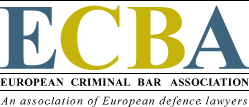Extradition and European Arrest Warrant
The extradition and EAW working group focuses on remarkable or interesting extradition cases.
Once a month a virtual meeting is organised, allowing any of the members to ask the floor (beforehand or “on the spot”) to share information on extradition or EAW cases they deem potentially interesting for other members: extradition requests to certain countries that have been refused, EAW’s that have not been accepted by the requested state etc.
The aim is to learn from each other’s experiences and to maybe use the information in later cases. The forum is practical and does not take more than 30 minutes. The agreed meeting date is the first Friday of the month at 4.30 PM CET (3.30 PM UK).
If you are interested in joining the working group or simply want to discuss, please contact This email address is being protected from spambots. You need JavaScript enabled to view it.
The European Criminal Bar Association (ECBA) has submitted a response to the Committee on the Processing of Data (CPD) in relation to proposed amendments to the Statute of the Commission for the Control of INTERPOL’s Files (CCF).
Our submission highlights key concerns regarding the protection of fundamental rights within INTERPOL’s processes, and emphasises the need for stronger safeguards to ensure fairness, transparency, and accountability.
We welcome this opportunity to contribute to the CPD’s consultation process and remain committed to engaging constructively on reforms that uphold the rule of law in international police cooperation.
Read our full submission and check the CPD's call for papers.
On the eve of INTERPOL's General Assembly, the ECBA issued a Statement calling on the organisation and member countries to reaffirm their commitment to uphold human rights standards.
The ECBA message emphasised that fundamental rights, due process, and fair trial standards are crucial to the functioning of a system of international cooperation in criminal matters.
Click here to read the Statement in Portuguese.
© 2026 ECBA
